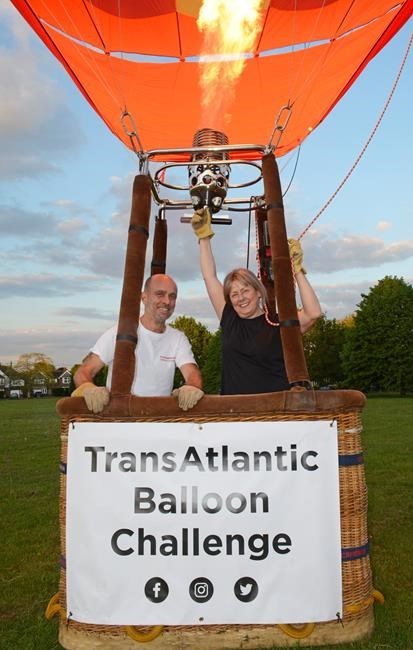FREDERICTON — A British couple is hoping 2021 is their year for a record-setting transatlantic balloon flight after the COVID-19 pandemic deflated their plans last year.
Deborah Day and Mike Scholes of Sussex, U.K., are hoping international borders will open by summer to allow them to attempt their crossing from Sussex, N.B., to Europe.
"We've decided to make all the preparations and get it all ready. It's easier to put the brakes on than to wait until we've definitely got the okay and then start tidying up the loose ends again," Scholes said in an interview Saturday.
If successful, Day would be the first woman to captain a transatlantic balloon crossing, while Scholes would become the first blind crew member on such a trip.
When asked why they want to attempt the crossing, Scholes simply said they were looking for a challenge. He said the couple has previously flown over the English Channel and the Alps and called a transatlantic flight a logical next step.
Day and Scholes will be traveling a 27-metre Roziere balloon that uses helium in a cell at the top and hot air below.
They originally planned the flight for 2019, but a worldwide shortage of helium sent prices sky high. The COVID-19 pandemic shut down plans last year and threatens to cause further postponements this summer.
The couple would like to arrive in New Brunswick by mid-June, but at this point the province isn't allowing entry by non-essential visitors.
"At the moment British people are not allowed overseas travel. The earliest that is going to be lifted, the government has told us, is May 17," Scholes said.
Both he and Day have had their first shots of COVID-19 vaccine and are scheduled to get their second doses in May.
Scholes said the best time for a transatlantic flight is June or July because the nights are shorter.
"It's at night time that we would need to have the burners on to keep the envelope at the same temperature. Which means the gas is at the same temperature and we'd stay level," he said.
"As the nights get longer we are going to need to carry more propane. With more propane it makes the balloon heavier and we wouldn't be able to go as high."
Scholes, 67, learned to fly balloons with Britain's Royal Air Force Reserve before a hereditary condition caused him to lose his sight in 2007.
Scholes eventually got a friend to take him and Day, 57, on a flight, and she enjoyed it so much she got her own licence.
Depending on weather conditions, the transatlantic crossing could take between five and 10 days.
Any profits from the flight will go to the group Blind Veterans U.K. which has provided Scholes with rehabilitation and training.
This report by The Canadian Press was first published March 14, 2021.
Kevin Bissett, The Canadian Press

